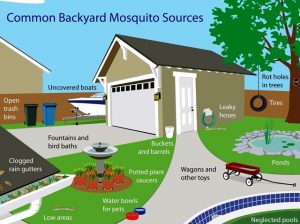The most effective way to reduce the risk to West Nile Virus is to prevent exposure to mosquito bites. Mosquito bites can be avoided both by behavior choices, and by eliminating mosquito breeding habitat. It takes only a couple of teaspoons of water for a mosquito to lay eggs. Simple preventative measures can help stop breeding and make your home and living conditions enjoyable and comfortable. The following are methods to reduce the exposure to WNV by reducing exposure to mosquito bites.
Practice the 3 D’s in Fight Against Mosquitoes: DEFEND, DRAIN, DRESS
- DEFEND against mosquito bites by using DEET, or other EPA-approved mosquito repellents to protect uncovered skin.
- DRAIN all standing water from objects on your property that may serve as a breeding ground for mosquitoes.
- DRESS appropriately by wearing light-colored, loose-fitting, longed-sleeves shirts and pants.
Protect Your Home and Family Against Mosquitoes
 Avoid overwatering your lawn and landscape.
Avoid overwatering your lawn and landscape.- Clean or drain livestock watering tanks every week or use an inexpensive mosquito dunk to control mosquitoes. The mosquito dunk is non-toxic to animals.
- Avoid being active from dusk to dawn when mosquitoes are most active.
- Report any abandoned swimming pools in your neighborhood. Water can collect in the pool and become a prime mosquito breeding location
- Prevent household places from accumulating water, including potted plants, pool/spa covers and birdbaths from collecting water.
- Stock your ornamental pond with mosquito fish, koi and/or goldfish. Ponds with healthy, hungry fish will eat most mosquito eggs, larvae and pupae.
- Thin out pond lilies or other vegetation, and fully drain your pond for cleaning.
- Replace broken screens and doors to keep mosquitoes outside.
Additional Resources:
For more information on mosquitoes and vector-borne diseases, please visit the following websites:
Idaho Dept. of Health and Welfare
Larvicide is used to help kill mosquitoes when still in the larval stage (living in water). Aerial applications of VectorPrime, a biological larvicide, are used when needed as a method of control.
Naled, also known as Dibrom, is an organophosphate insecticide applied aerially. When necessary, the Ada County Mosquito Abatement District will use this product. Its primary use is to control (kill) adult (flying) mosquitoes. To learn more about Dibrom.
Before traveling to your next spring or summertime vacation destination, be sure to research the hotspot for mosquito activity and potential risk for contracting a disease transmitted by mosquitoes. The Center for Disease Control (CDC) tracks regions worldwide where infectious diseases are considered prevalent. Click CDC Travel for a list of on-line recommendations for travelers.
